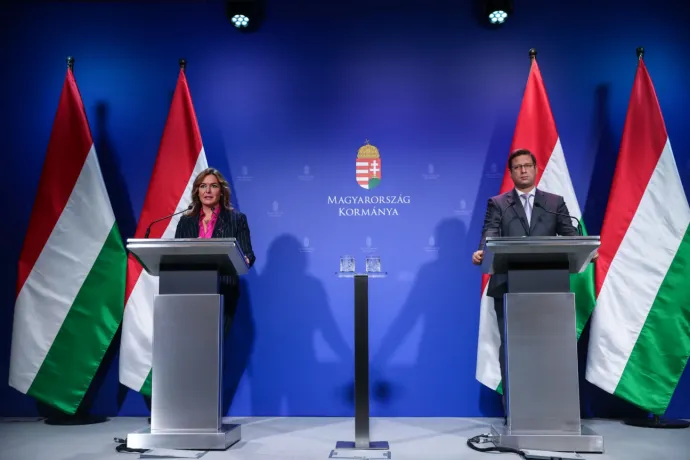Hungarian government announces national consultation on economic neutrality

This week's government briefing, hosted as usual by Minister of the Prime Minister's Office Gergely Gulyás and Government Spokesperson Eszter Vitályos started with the announcement about plans for yet another national consultation.
Gulyás explained that the decision was made at the cabinet meeting on Tuesday to hold a national consultation on an economic policy designed to deliver more effective growth in the forthcoming period. A social media post published by Fidesz' parliamentary group leader Máté Kocsis on Monday contained strong hints to a national consultation about economic neutrality – which has recently become the new buzzword in Hungarian government circles. The Prime Minister has been speaking about the importance of economic neutrality for Hungary often, and laid out his reasons in a presentation a few weeks ago.
The new national consultation will consist of 11 questions, the minister told Origo. The consultation's questions will be presented this week and questionnaires will be sent out in the first half of November, with the deadline for returning them being 20 December.
According to Gulyás, Hungary needs to focus on economic growth, and the basic condition for this is economic neutrality, meaning that Hungary would not join any trade wars.
What matters most is to bring the latest technologies to Hungary, regardless of whether they are coming from Germany or China," he said.
The budget for the national consultation will be transparent, but will only be made public after its conclusion, Gergely Gulyás said. In the past, they never announced in advance how much would be spent on it, and they won't do it this time either, he explained.
The technical cost of the most recent consultation about "Brussels' sanctions" was 2.7 billion forints. While it was going on, last November, we took a detailed look at what these surveys look like, their methodology and usual findings.
The beauty of democracy
Voters are the ones who decide who should represent them and who should be in government, Gergely Gulyás said in response to a question about the EPP's Facebook post calling for PM Viktor Orbán to leave. He added that the government's response to this is that they will defend the country's sovereignty.
Gulyás added that the EPP and the European Commission have clearly announced that they want a new government in Hungary. The minister said that this is the beauty of a democracy: it is not up to Brussels or Washington to decide who should govern Hungary, but the Hungarian people. "We thank the EPP for their opinion, but we reject it as unauthorised," he commented.
He also said that the EPP had sued the European Commission to prevent Hungary from receiving the funds needed to raise teachers' salaries. The minister added that the funds would arrive regardless, but it was a good example of the EPP working against Hungarian teachers.
The government is very calm
Both the country and the government need a calm, resolute strategy and decision-making, and for this reason there shouldn't be too much significance given to public opinion polls, he said, reacting to the results of a Závecz poll published last week, which showed that Fidesz's support among those certain to vote had fallen to 39 percent, while Tisza had moved up to 35 percent. Gulyás said that between elections, polls are used for political purposes and interests, but we did have a large "survey" in June, the EP elections. Gulyás said the government has also commissioned opinion polls of their own and they are very calm.
Fewer Russians working in Hungary than elsewhere in the EU
Gergely Gulyás reacted to the news that two Dutch parties would temporarily suspend Hungary's Schengen membership due to the threat posed by Russians getting work visas from Hungary. The minister said that there are significantly fewer Russian citizens working in Hungary than in Western Europe and that there are strict rules in place, with visas only being granted following a national security check.
In Gulyás's opinion, there was no realistic prospect of Hungary being suspended from the Schengen Area. He also said that if they want to suspend anyone, they should first exclude countries which are not protecting their external borders. He also said that about 30 percent fewer refugees had arrived at Hungary's southern border this year, and that Hungarian police and the border hunter units had been able to intercept all of them.
For more quick, accurate and impartial news from and about Hungary, subscribe to the Telex English newsletter!